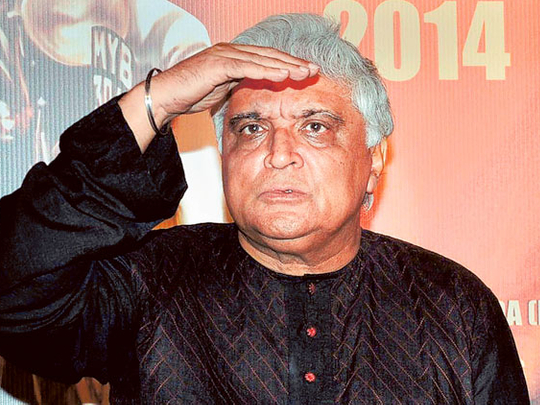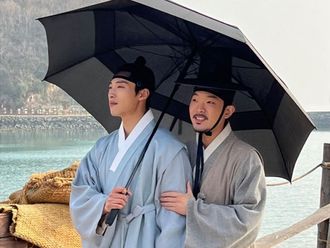
I would have called him a “yesteryear” lyricist and script writer but Javed Akhtar will give you no reason to believe so. He may have been on hiatus from the big screen for close to a decade after Lakshya but he now has a script ready to be shown to the right director, and has been constantly in the news due to his strong political and social beliefs and films such as the remake of Zanjeer and Sholay.
Akhtar, who will be in Dubai this Friday for An Evening with Javed Akhtar… In Conversation with Gagan Mudgal, hails from a family studded with literary jewels. His great-grandfather was Allama Fazl-e-Haq Khairabadi, one of the main figures of the Indian Rebellion of 1857; his father, Jaan Nissar Akhtar, a famous lyricist and Urdu poet; his maternal uncle, Majaz, was another famous Urdu poet. He was married to Honey Irani, an award-winning Indian screenwriter and mother to Farhan and Zoya Akhtar. Even his wife Shabana’s father, Kaifi Azmi, was a renowned poet and lyricist of his times.
And the tradition continues, Akhtar says, with Farhan and Zoya, though, unlike him, they choose their medium to be English rather than Urdu.
“Both of them write poetry in English as that’s their first language. They have written lyrics in English for [Gurinder Chaddha’s] Bride and Prejudice,” said Akhtar over the phone from New Delhi. “[Urdu] is the language I’ve been born into — it’s my mother tongue. As a matter of fact in Hindi films, until now, most song writers such as Sahir [Ludhianvi], Gulzar, Majrooh [Sultanpuri], Shakeel, Rajendra Krishna, Anand Bakshi, Jaan Nissar Akhtar, Kaifi Azmi — I can go on and on — have all written in Urdu”.
Yet you’d be surprised to hear his caller tune. Where I thought I’d be greeted with an award-winning Sandese Aate Hai or Kal Ho Na Ho or Jashn-e-Bahara, or even a popular Ye Kahan Aa Gaye Hum, it was, for me, an unfamiliar English song. Excerpts from the interview:
With films such as Dabangg, Chennai Express, Golmaal, Grand Masti, Rowdy Rathore… making more than Rs1 billion (Dh59 million) at the box office, where have we lost the art of scriptwriting and good lyrics?
The lack is not in Indian cinema. We forget that Indian cinema is part of society. Whatever happens in society reflects in cinema also. In the last 20-30 years in our education system and at home, literature, poetry, fiction, have not been given the kind of importance they used to be. So people who are growing up, people who make things, people who write things and people who go to the theatre are not familiar with poetry. Most of them don’t have roots in their own language. Most of them have a much smaller vocabulary than his or her parents or the generation earlier. The fact is people who have not been brought up on poetry, who have never heard poetry or people discussing poetry, who’ve never read a book of poetry, obviously their aesthetics of art will not be as developed as it ought to be. Yet, in all fairness, there are some very good films being made today.
Recently Apoorva Lakhia remade a cult superhit called Zanjeer. As the script writer (with Salim Khan) in the original, what do you feel about this flop film?
I haven’t seen this Zanjeer. People have said they didn’t like it. In fact Salim Sahab and I had a court case for how our script was remade without permission. And the judge advised a compromise and a certain amount was decided in the judge’s chamber which they paid to us. We were only requested not to publicise it, which we did. And because the film didn’t do well, there was a joke going around that Salim and I were probably the only people who made money out of it.
So are you saying films shouldn’t be remade?
Remakes, per se are neither good nor bad. What’s important is how you do them and what film you have selected. What are you adding to it, is the question. Mother India was a remake, The Departed, which got Martin Scorcese an Oscar was a remake, Devdas was a remake. Mughal-e-Azam was a remake because Anarkali was made earlier. Farhan’s Don was a remake. Ten Commandments have been made again and again and each time it has become better. There are many examples but how you’ve done it is what is important. Yet there are certain films that should not be remade because I feel that particular script has been used to its optimum. What is the point in remaking Gone With The Wind or Ben-Hur or The Godfather? Similarly there was no point in remaking Sholay. Somebody did and he fell flat on his face. Why not make a much better film with some other script?
You have been part of the judging panel of Indian Idol. How much do these shows help in the success of these talented singers?
These shows — Saregama, Indian Idol, etc — give boys and girls from small towns national and international exposure and in a short period of time. They are admired and known faces wherever they go in India. As a matter of fact people highly enjoy watching the programme. So it’s good for the viewers and the TV channels who make so much money out of them and it’s good for the participants because even if they don’t win it but are in the top four or five, they get to perform on stage nationally and internationally. They have homes in Mumbai, they have cars, they have a decent lifestyle. So it’s a good deal for everybody.
You are one of the Indian celebrities who tweets regularly. How much has it helped celebrities, not just to interact, but be closer to their fans and followers?
Social media is a great, great privilege to interact with people, to understand, to empathise and to have better knowledge of one another. But I’m afraid it’s quite often misused rather than used. It doesn’t spread love or understanding and becomes a vehicle for spreading misunderstanding, misinformation and discord. It’s sad.
There is always a bone of contention where performances of Indian artists in Pakistan and Pakistani artists in India are concerned. Why cannot there be a free exchange of art between the two countries, when much of it is similar?
It shouldn’t be like this but those who do have a reservation about it have a point, too. You see, to a great extent it’s a one-way flow. Is it not surprising that Lata Mangeshkar who has such tremendous popularity in Pakistan has never had a show there? Public performances by Indian artistes, if they happen, are not good experiences. Their media doesn’t give our stars publicity. On the other hand, any Pakistani artiste who comes here is given a royal treatment. They are invited to all television channels, including the government channel. But this has not been reciprocated. I don’t know if it is now. Yes, there are extremist elements in India who are quite vehement about it but I think Pakistan’s government and cultural policies provide solid reasons to these people.
You are very clear in your political beliefs. Recently there was a furore on twitter against your statements to Narendra Modi and many had retaliated in a way you called “vulgar”. At a time when many of the country’s governors are corrupt, what do you think India needs?
Perfection is an illusion, a mirage, which no society has ever reached. But the fact is India is moving ahead. India in which I was born and India which I’m living in today, are different places. Yes, we still have a huge middle class, we still have people living below poverty line but people are crossing those lines to move upwards towards affluence. And this upward mobility is seen constantly. Sometimes it increases, sometimes it slows down. In spite of all the things you hear or read on the front page of the newspaper the society is surely moving forward.












